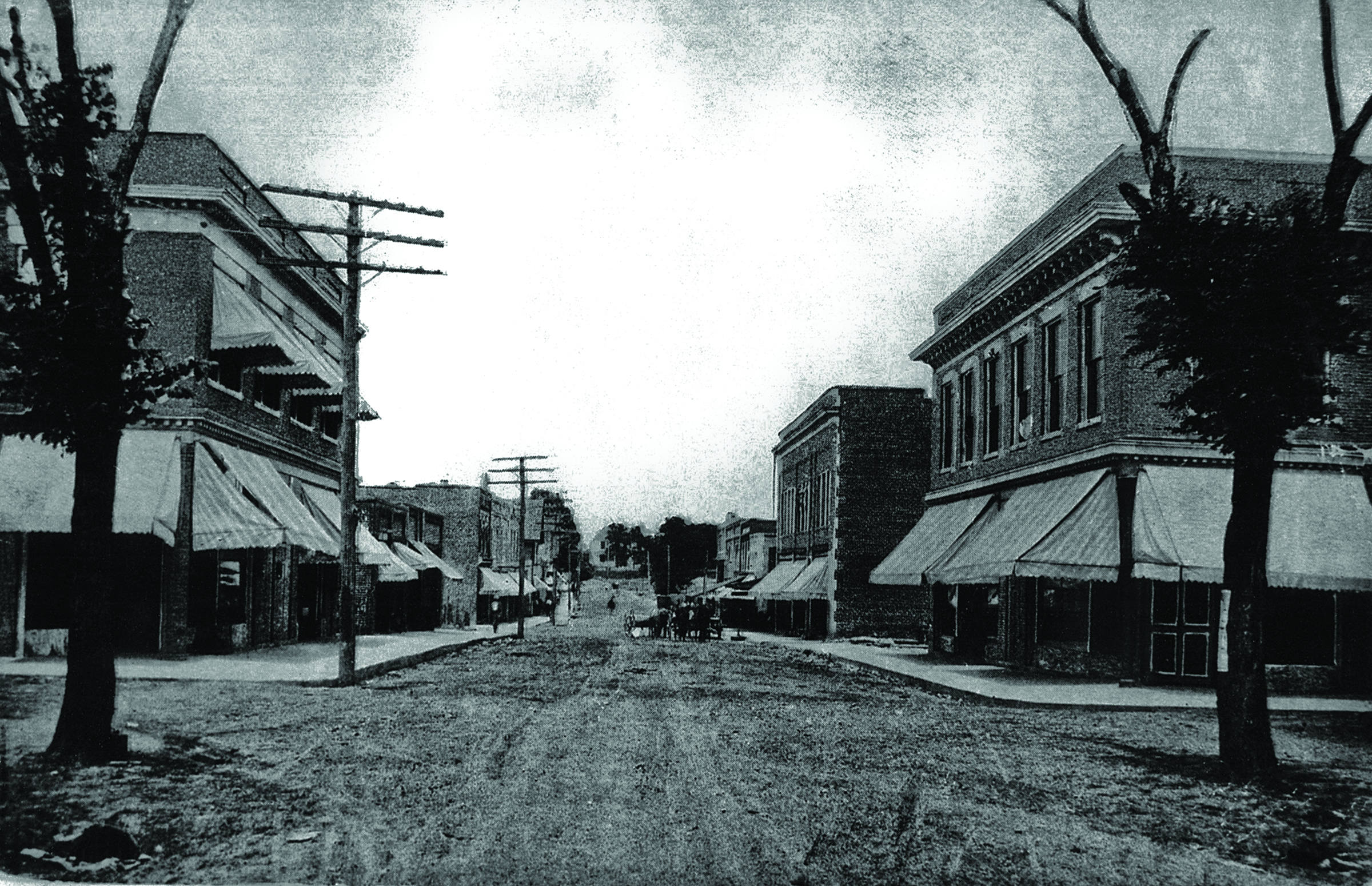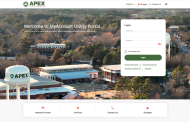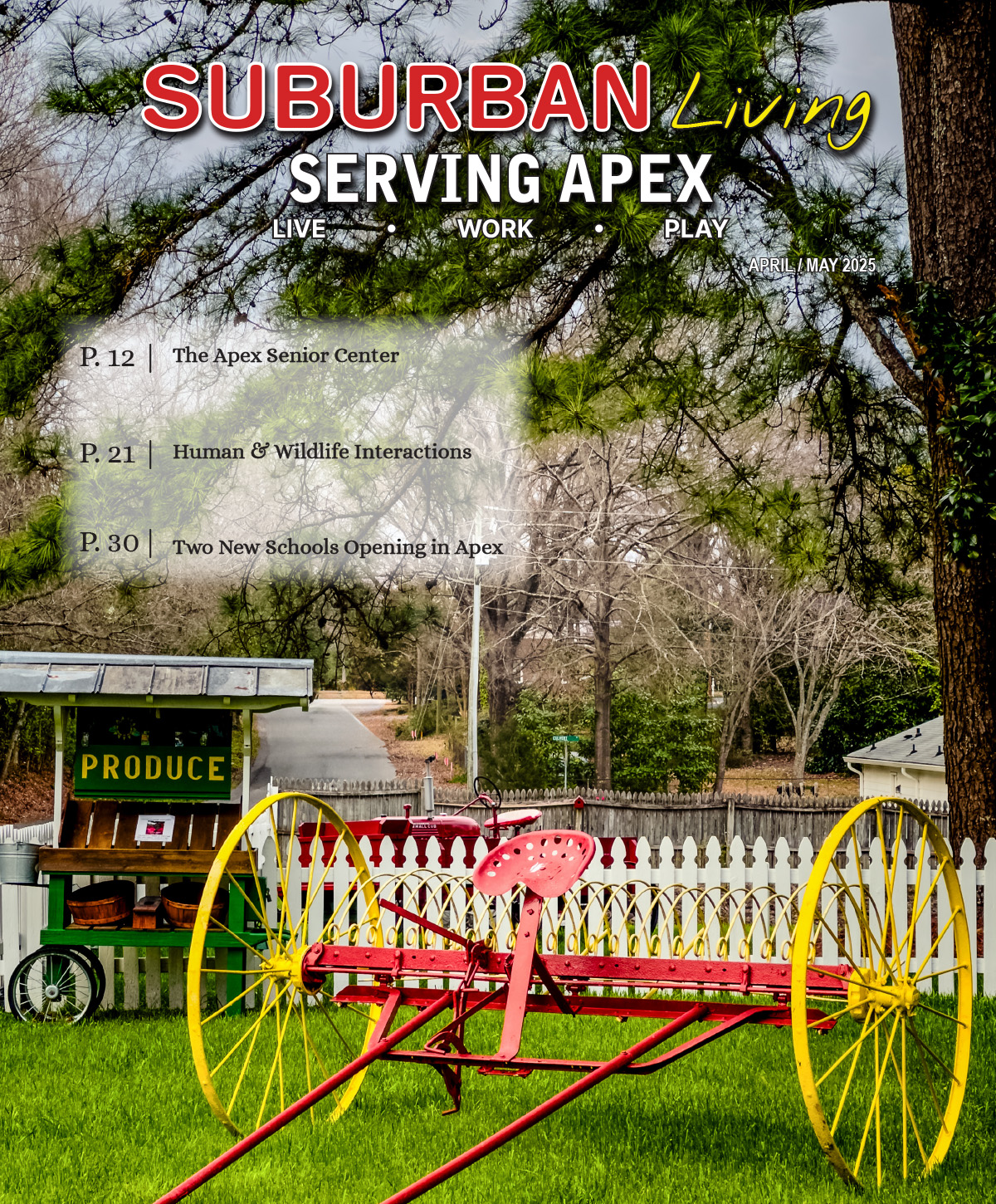Toby and Warren Holleman took their mother and father’s love for oral traditions, old stories and historic events and transformed them into a tribute to the town, its people and perhaps, most poignantly, their parents.
That tribute is their book titled Pluck, Perseverance, And Paint, Apex, North Carolina, Beginnings to 1941. It is a splendid, must-have history book for anyone who lives in or loves this southwestern Wake County town. Note: Copies can be found at The Rusty Bucket on Salem Street or online at www.apexhistory.org for those who are interested.
But, this article isn’t really about the book. Rather, it’s about the authors, C.P. “Toby” Holleman, Jr. and Warren Lee Holleman. These brothers, separated by three years (i.e.,Toby born in 1952 and Warren in 1955) and sons to Carl P. Holleman and Ruth Holleman, have become the de facto historians for Apex.
Warren noted that while his older brother carries his father’s name, “Toby” stuck as this was the name of the son of the surgeon for whom Ruth worked. Toby is a retired minister and is married to Connie. They have two children and still live in Apex on Hunter Street in his childhood home.
Warren (named after his mother–her maiden name) is a retired professor who lives in Texas (Houston) with his wife, Marsha. They also have two children.
Their parents, Carl, who grew up near Holleman’s Crossroads or Buckhorn as he always noted and Annie Ruth, from Newton Grove, had deep love for Apex. Carl seemingly knew everyone and their family history. Annie Ruth, while not an Apex resident, cultivated friendships across economic and racial lines. Their love of the community was unmistakable and it manifested itself in June 1972 when Apex was one year away from its Centennial celebration.
According to Warren, there were really two things happening in Apex back then.. Apex was floundering while Cary was growing and expanding. Cary was incorporating land aggressively and strategically. Apex was one mile square and town leaders at the time didn’t see the need to expand. The progressive business people in Apex saw opportunity in Cary and moved out. Apex had no vision for growth and it showed. Contrast this with the looming Centennial of 1973 and the palpable energy and excitement felt throughout the community.
Warren joked that the residents wanted to hold a beauty pageant, mustache growing contest and rocking chair contest simultaneously.
“Dad thought a centennial was about celebrating history,” Warren said.
Thus sprung the idea for the first book. With the Centennial coming, dad asked Toby (then a sophomore in college) if he could please write a little history of Apex. Toby took it on as a school project for college. This was a win/win in Toby’s eyes. He could get out of a class and get credits if an acceptable project took its place.
“Mom and I were Toby’s research assistants,” Warren shared.
At the time, Apex was about only 2,000 strong, but their father knew just about everyone and so Toby had many meetings with a wide swath of the townsfolk. In addition, Toby went through Apex Baptist Church records, read newspaper clippings and conducted an assortment of other tasks focused on unearthing as much local history as possible.
The research took place over the Summer of 1972. Toby wrote the book that Fall and edited it during mid- winter of 1973. It was printed during the Spring of 1973. The 500 copies sold out in no time.
Soon after, Toby and Warren went off and started their careers and families. But, their father, who was co-founder of the Apex Historical Society in 1987, continued to write articles and essays about Apex history right up to the time of his death in 1992. His love for the town and its history never waned. The same was true for Toby and Warren.
In 2007 their mother’s health started to deteriorate. Warren noted that it was also around this time that he had grown disillusioned with his job and opted to quit so he could spend more time in Apex with his mother. He took care of her, ushered her to appointments and was generally there to help. It was around this time that he and Toby started contemplating a reprint of the first book after being urged and pushed to do so from all corners of the Apex community. Heck, it was 34 years since the first edition and there were more stories to tell.
Warren used this time with his mother to conduct new interviews with a host of long-time residents. These interviews and the stories gleaned from them are prominently featured in the 2010 edition. Warren noted how grateful he was to have sat with them and recorded their stories. As it turned out, many of them who were senior members of the community passed away not long after.
“To be able to capture their stories and record them meant so much,” Warren shared.
But, why so much love for local history?
Not surprisingly, for Toby, it was his father. However, Warren listed four influences.
“When I was a child, every Saturday, we would pile into the car before sunrise with the bird dogs to go quail hunting” Warren said.
This included his father, uncles and cousins. It was a family affair. They would walk through the woods together, woods where they all grew up, and would share stories about things that happened where they walked. For the adults, their stock and trade was knowing people and their histories.
“I was getting a history lesson for six hours every Saturday. This had a profound impact on me,” Warren said.
In addition, Warren cited his mother who would invite friends over to the house. Hearing their rich oral histories (i.e., across racial lines/no barriers) provide us with black and white perspectives.
“This also had a profound impact on me,” Warren shared.
Warren recalled how Toby invited him to help him with the first book during the Summer of 1972. Warren was 16 at the time. Toby asked him to research, among other things, how Apex got its name. Warren found the detective aspect to historical research to be exciting and fulfilling/invigorating. Warren shared that his contributions (the drafts) were never edited and went in the first edition “as is.”
“They were terrible,” he joked.
Lastly, Warren praised his teachers for the influence they had.
“I had some great teachers. Betty Olive Dennis taught local history. She was first in line for the book in 2010 and I didn’t recognize her. I felt terrible,” he shared.
They eventually become good friends and Warren found out later on that she was related to Warren two ways. Warren majored in history in college but did not pursue a career in history. He said he sometimes regrets that but also noted that having history as an avocation perhaps allowed for more flexibility and joy.
Today, both men continue to proudly and impactfully flex their historical muscles.
Toby was part of the Rosenwald School Preservation Project Committee which resulted in the dedication of a roadside marker near Apex Friendship Middle School. The next step will be to ensure the original Rosenwald School, which is just up the road from there is preserved.
Note: These all black elementary schools, some 5,000 of which were built between 1917 and 1932, were the result of a partnership between Julius Rosenwald (Sears, Roebuck & Company) and Booker T. Washington (Educator and prominent African American thought leader).
Before that, about five years ago, there was a lot of effort to take Friendship out of the name being bestowed on the new high school being built there. Toby provided moral support for the mostly black neighbors and friends who advocated to keep Friendship in the school’s name at a critical school board meeting. The board voted to call the school “Apex Friendship School.”
“My memory is horrible about most things these days but my brain seems to be wired for history,” Warren said.
Recently, Warren was asked by playwright, Angie Ottosen-Staheli, to be a contributing historian for her musical, Finding Patience, which is about the history of Holly Springs. Warren noted that many of the characters in this play were his ancestors.
“It was gratifying to see my ancestors on the stage. I wished my father could have seen it, ” he shared.
Warren also shared a story about the trails around Harris Lake Trails which is where his father grew up (Buckhorn township) before it was flooded. They had a neighbor, Ruben Carpenter, who was a moonshiner, bi-racial and a bit of a loner. After the area was flooded to make Harris Lake, there was a long-standing mystery around where he was buried. Recently, on a walk around Harris Lake, Warren believes he found the grave. Detective Holleman solves the case again!
“This was a needle-in-a-haystack kind of thing,” Warren said.
If confirmed, this would be a revelation for Ruben Carpenter’s family and provide some closure.
Toby also shared that he and Warren occasionally host a podcast focused on Apex history. This is part of the PeakCityPodcast series, which is a collaborative effort with the Apex Chamber of Commerce. True to form, Toby and Warren tell true stories about Apex. Their next podcast is slated for September where they will tell the stories of three Apex youth who grew up to become famous Americans. Visit PeakCityPodcast/history for more information.
Both Toby and Warren speak fondly about Apex. The Apex they knew growing up when the town had about 1,000 residents and the Apex of today, with approximately 60,000 residents (based on 2020 data).
Toby recalled coming back to Apex in the mid-90s (i.e., he lived in a variety of places around the US and in Europe for a time) and took a familiar and oft-traveled short-cut and wound up getting lost. He also noted that the working dairy that was across the street from his childhood home was replaced by a large subdivision.
“This is not Old Apex which was a farm to market town. In the past, even into the 1960s, mules could be found downtown since this is how people got around. Saturday was farmer shopping day. Not today,” Toby remembered.
Apex is now a suburb.
And, though Toby has lived in a variety of places over the course of his life, whenever he was asked about “home”, his thoughts always turned to Apex.
“I have felt like a Tarheel all of my life and Apex is my home and always will be. It’s changed significantly and I love the new/different people. I find it sometimes sad that I don’t hear southern accents as often. I also like the political disposition of the town today vs. before and I was proud when Apex garnered the Best Place to Live in America in 2015,” Toby said.
Warren shared that his formative years were spent in Apex When he looks back on his life, he knows it was Apex that forged his value system. He still has the sense that he is going to see someone he knows when he dines out in Houston, a city of more than 7 million. When you grow up knowing everyone, you can understand why.
But, Apex wasn’t perfect. There was gossip (of course) and there was segregation. This leads to one of the most impactful moments in his life when segregation ended in 1970. Warren noted that because of this experience which he was immersed in and witnessed first hand, he became really sensitized to prejudice.
“I really got to hear their stories and see life through someone else’s eyes. I don’t think I’ll ever experience anything as powerful as that transition. Suddenly you flip a switch and everything changes. I got to see it and it felt like a miracle,” Warren shared.
So, for Warren, not only did this small town do something really good but so did his parents who were very progressive, by southern standards. And, for the most part, they were very supportive of desegregation and equality.
“They frequently stuck their necks out and I got to see that and I always respected them for that,” Warren recalled.
Toby noted that in the early 1900s, the Apex town motto was Pluck, Perseverance and Paint, which of course was used years later for their history book title.
“When we tell these stories we are trying to connect to that same pluck, perseverance and paint,” he shared.
He then referenced the great Apex fire of 1911 which destroyed much of downtown. This was after a smaller fire in 1905. The town learned a hard lesson and replaced the wood architecture with brick. Toby pointed out that today, if you look from the stoplight, north down mainstreet the buildings are continuous to one another, all connected and all composed of brick.
In some sense, his description of the buildings reflects the history of Apex. These stories continue to be told and are inexorably connected and will ultimately stand the test of time.
“I wish we preserved more of these stories,” Warren said.
“I think my dad, by himself, was trying to preserve history for a long time. Now more people are getting interested in history and that’s nice,” Warren closed.
Why write a book about history?
For the Holleman brothers, it seems to be about passing on lessons learned, sharing wisdom and preserving true stories. Their continued love for Apex history and willingness to share it is a standing tribute to the town, its residents–old and new– and perhaps most importantly, to their mom and dad.








